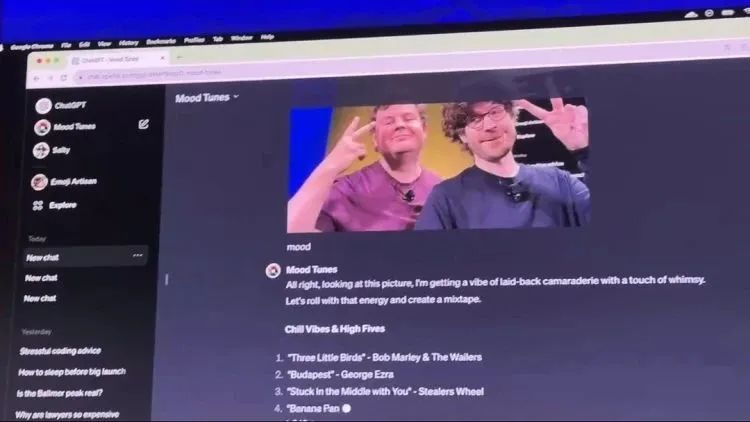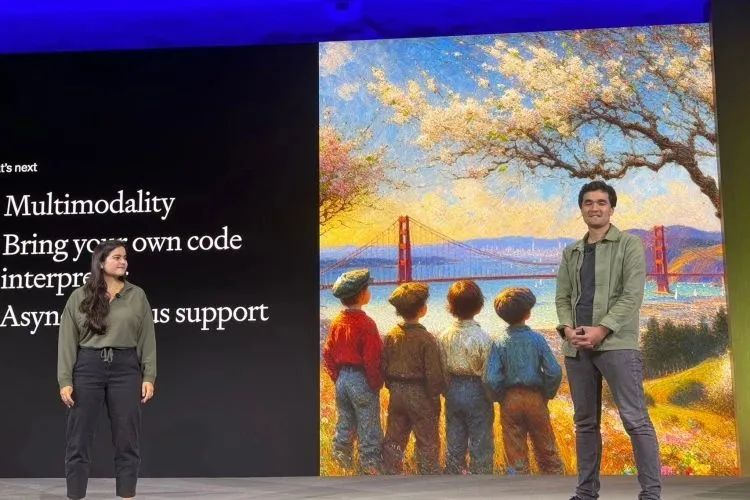The OpenAI conference, which is destined to go down in the annals of human technological history, has been over for a day, but it is clear that its impact is significant, as people are still trying to understand its significance. There has been a deluge of analysis and organization, but firsthand information is equally important. "Silicon Star" and the developers who attended the conference had a chat and put together this self-narrative, which may help us better understand what happened.
Original Source: Silicon Star

Image Source: Generated by Wujie AI
Driving back to the South Bay from the OpenAI developer conference's after party, it was nearly midnight. Driving along Highway 101 in the vast night, numerous tech companies of all sizes flew past the car windows. With complex emotions, it felt like my brain was a bit overloaded.
I should go home and get a good night's sleep, but it seems like I can't fall asleep.
OpenAI's first DevDay can indeed be aptly described as the "Spring Festival Gala" of the AI industry. The amount of information throughout the day was enormous: ChatGPT and API received comprehensive updates from models to ecosystem, developers gave in-depth demo presentations, and partners took the stage for group performances. People who were still not satisfied continued to head to the night scene for networking.
In addition to the impact of OpenAI's latest technological achievements, other gains included: meeting many outstanding AI practitioners, a $500 OpenAI usage quota, some commemorative souvenirs distributed at the event (the hoodie looked pretty good, and many people put it on right away), and the most "shocking and rejecting" thing:
A sense of despondency, confusion, and unease.
Since the announcement in September that OpenAI was going to hold a developer conference, the AI community has been buzzing with excitement. Naturally, I hurried to register, fearing that I might miss this opportunity. Even though the $450 price tag was not affordable for everyone, tickets were still hard to come by.
Due to the selective admission of the audience, many friends who signed up were rejected, including some engineers working at major companies and outstanding project leaders selected by Y Combinator. No one could figure out what the mechanism was for OpenAI's selection process. "Maybe it's just AI random draw," joked everyone in the WeChat group created before the event.
A week before the event, Sam Altman tweeted, "We have some great new things for you!" A few days later, various possible updates "leaked" online. Some netizens went to the scene to check it out, while others posted tickets seeking event "partners."
The public's anticipation was already at its peak, and it was clear that something unusual was about to happen in the AI industry.
On the morning of November 6th, when I arrived at the venue, there was still an hour and a half before the official start, and the ticket inspection line had already stretched out for dozens of meters. At the entrance hung the sign for OpenAI DevDay, and the staff enthusiastically waved and called out, "Welcome!" and "This way, please!" Developers from around the world gathered, unable to contain their excitement, raising their phones to record the event, as if they were attending a grand party for the dream-making of artificial intelligence technology.
Unfortunately, the subsequent developments indicated that this excitement seemed to be wishful thinking. The developers' high spirits in this conference, described as a conference for developers, only lasted for a pitifully short time.
At exactly 10 o'clock in the morning, with the pulsating music and enthusiastic applause throughout the venue, Sam Altman took the stage on time to deliver the keynote speech, the highlight of the day.
Despite his slender figure and understated Silicon Valley programmer attire, his speech was calm and unhurried, and lasted only 45 minutes. Yet, the people in attendance could still discern the enormous ambition hidden beneath Altman's calm exterior.
As various improvements and new features of GPT versions continuously appeared on the large screen behind him, in addition to amazement and shock, soon, even the people at the conference who had seen many Silicon Valley conferences began to feel a bit scared.
As the conference progressed and Altman introduced each update, the atmosphere in the audience became increasingly complex, and the applause was at times enthusiastic and at times sparse. People stared intently at the demonstration screen, their faces showing seriousness, gradually unable to smile:
The new GPT-4 Turbo, which does contextual window optimization, has expanded its length to 128k tokens, equivalent to processing 300 pages of text at once, with significantly improved accuracy.
The upgraded GPT can access data up to April 2023 for knowledge base expansion, and promises continuous updates.
The new GPT supports multimodal and fine-tuning, with DALLE-3's strong ability in text-to-image generation, and the open-source speech recognition system Whisper v3 is nearly 20 times cheaper than ElevenLabs.
GPTs are introduced for AI assistants and GPT helpers, allowing everyone to create customized chatbots with zero code base, just by conversing, and the functional scenarios and tones can be selected at will, and can be launched in the GPT store for sharing and earning money.
For developing AI agents, the Assistant API is launched, allowing for natural language description of commands to obtain a persistent and infinitely long-threaded AI assistant for their own applications.
After this "bloodbath," it seemed that at least half of the startups at the scene had collapsed. Countless projects that had been toiled over for nearly a year were instantly obliterated by OpenAI; and countless AI startups in the market lost their meaning overnight.
Regarding the directions that everyone wanted to pursue, it was nothing more than thinking that OpenAI was not comprehensive enough or had not yet ventured into. However, OpenAI not only saw and improved upon those shortcomings and expandable spaces, but also personally stepped in and did it faster, better, and more comprehensively.
"Then what should I do? My company can close down," a young Indian man next to me joked self-deprecatingly, while looking at the big screen in a daze.
And the greater sense of crisis comes from the fact that these new features today are just the first "welcome." With OpenAI's consistent style and speed, who knows what "terrifying" things the next iteration will bring, and it will probably be even more brutal.
"And think about it, Anthropic hasn't even been released yet. They must be doing this because OpenAI isn't enough, right? In the end, they will all be taken over by these few, can small companies still survive?"
Among the audience, some were whispering and discussing, some were constantly taking photos to send to colleagues, and then hurriedly sending messages. After the event ended that day, including my own company, the AI departments of various Silicon Valley giants urgently held discussions.
I have never seen such a scene of giants being so nervous and working overtime for a company that they didn't pay much attention to a year ago. It's quite an eye-opening experience.
The morning session was publicly broadcast, and after it ended, I took a quick glance and indeed, secondhand information was already overwhelming.
But I didn't have time to look closely. The event actually lasted all day, and during the lunch break, no one felt relaxed. The festive atmosphere from the morning had clearly been replaced by a huge collective anxiety. Although OpenAI had prepared thoughtful meals for this social event, everyone's minds were already filled with various question marks, eagerly needing to find someone to communicate with and seek answers during this gap. It was as if they could finally catch their breath after being held underwater.
In the outdoor rest area, everyone surrounded the OpenAI product managers and developers they "caught" at the scene, eagerly asking about the direction of their next iteration, hoping to find out if their own products had unfortunately been included in OpenAI's "to do list."
It seems that this was the first time I saw founders of startups in Silicon Valley Developer Day so anxious and "humble."
But not everyone was like this.
During the conference, I noticed a company specializing in AI interior design. They had been deeply involved in the design field for many years, had a stable user base, and had deep industry accumulation. They had already completed Series A financing. Throughout the event, their founder had been applauding excitedly and giving only positive feedback.
After careful observation and a discussion with a few friends, we all felt that the points summarized from these people who were still applauding were: Focusing on deeply rooted vertical fields, having a good product in itself, and AI only made it better.
The afternoon session was more focused on the developer stage, where OpenAI developers provided further in-depth demonstrations and explanations of the updates announced in Altman's speech. There were also roundtable discussions with enterprise partners such as Salesforce, Shopify, and Typeform, sharing the AI innovative products they had built through OpenAI.

Staff taking selfies on site, demonstrating the 'Mood Tunes' feature of the self-made GPT, which recommends playlists based on the atmosphere of the image.

Next steps: Multimodality, Bring your own code interpreter, Asynchronous support
As I listened in the afternoon, I felt that there are benefits to not having a live broadcast, otherwise the panic might be even deeper. Listening to one session after another, it becomes increasingly clear that the term "AI unicorn" can no longer describe OpenAI.
They have resolutely (and possibly premeditatedly) laid out their plans, lowering the technical barriers to entry for the general public, from the GPT Store, which imitates the App Store and Google Play Store, to the easily creatable API assistant, and the development of multimodality. They are attempting to monopolize the industry market with an all-in-one strategy, while increasing speed and lowering prices.
It seems that the message Ultraman wants to convey is this: all you geniuses in Silicon Valley, you can also do these things, but it's best to do them with me, otherwise it will be difficult to succeed. It is evident that OpenAI is trying to create a complete developer and user ecosystem with one goal: to become a giant and then dominate the market.
And we can't help but start thinking, as AI entrepreneurs, what is the next step for us?
The discussion resulted in the following options to share:
1. Can't just develop downstream applications for large language models, at best it's just a shell company, and it's easy to lose dominance at any time. You need to delve into vertical fields, master the internal details of the industry, and discover and utilize complex scenarios and niche market opportunities that standard assistant APIs cannot satisfy.
2. Product and market are crucial. With the competition from OpenAI, the disparities at the technical level will always be leveled out. The real difference lies in the precise capture of market pain points and user needs. A first-class product management team, efficient sales strategy, and a stable customer base are important factors that differentiate winners from losers.
3. If you can't beat them, join them. Quickly join the GPT Store and become a leader (seriously).
Overall, many developers from the previous era—understanding code, then finding gaps, and optimizing—are coming to an end, and new developers will be defined by OpenAI. It must be accepted, and thinking about it still feels terrifying.
Although the OpenAI developer conference had a strong impact and generated waves of discussions, after the revelry, we still need to continue working hard. Perhaps many people will need to adjust their direction, or even reset their future strategies, but in the rapidly evolving field of AI, change is the only constant.
In addition, Microsoft CEO Satya Nadella's return from the OpenAI conference caused the company's stock price to soar, reaching a historic high. We can only wait and see what major moves will be made in future ecosystem alliances.
When the two people, who are both partners and competitors, were on stage for a Q&A, the atmosphere was quite delicate, did you notice?
免责声明:本文章仅代表作者个人观点,不代表本平台的立场和观点。本文章仅供信息分享,不构成对任何人的任何投资建议。用户与作者之间的任何争议,与本平台无关。如网页中刊载的文章或图片涉及侵权,请提供相关的权利证明和身份证明发送邮件到support@aicoin.com,本平台相关工作人员将会进行核查。




